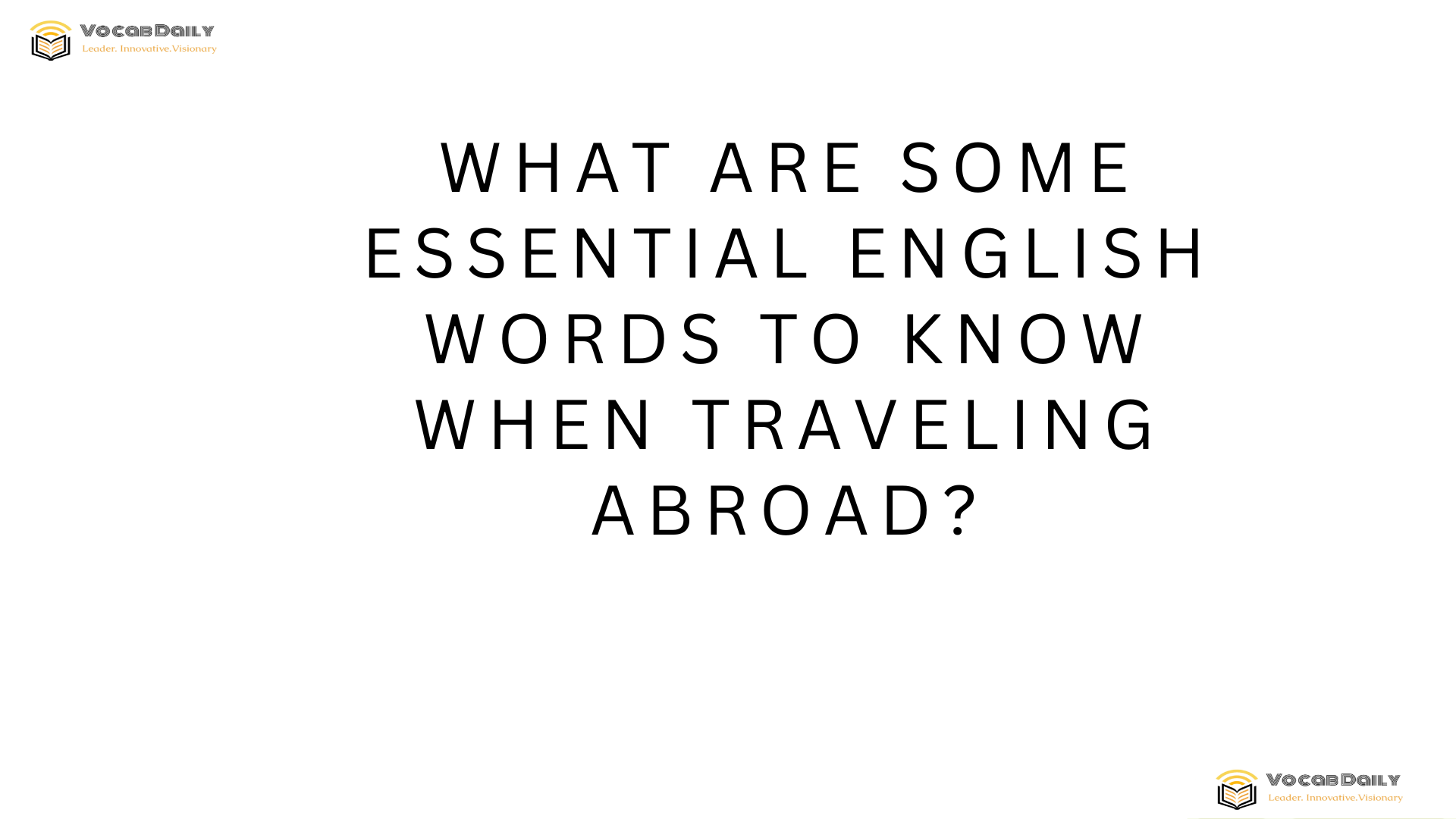What are some essential English words to know when traveling abroad
Basic Greetings and Polite Expressions
When traveling abroad, knowing how to greet people and use polite expressions can make your experience much more enjoyable and respectful. Simple words like “hello,” “please,” “thank you,” “excuse me,” and “sorry” are essential for everyday interactions. These expressions help break the ice and convey respect in different cultures. For example, saying “please” when making a request or “thank you” after receiving help is universally appreciated. Additionally, greetings such as “good morning,” “good afternoon,” and “good evening” are useful when starting conversations or entering shops and restaurants.
Numbers and Time
Understanding and using numbers in English is crucial for navigating transportation, shopping, and scheduling activities. Words for numbers from one to twenty are especially important, but being comfortable with tens, hundreds, and even a few thousand can help you handle prices, addresses, and time. Speaking of time, knowing how to ask and tell time using words like “o’clock,” “half past,” “quarter to,” and “quarter past” will help you stay on schedule. Asking “What time is it?” or “When does it start?” can prevent confusion in appointments, tours, and public transport timetables.
Directions and Transportation Terms
When exploring a new city or country, words related to directions and transportation are incredibly useful. Common vocabulary includes “left,” “right,” “straight,” “near,” and “far.” Asking questions such as “Where is the nearest bus stop?” or “How do I get to the train station?” will guide you efficiently. In addition, knowing the names of transportation methods like “bus,” “train,” “taxi,” “airport,” “station,” and “ticket” will streamline your travel experience. Words like “departure,” “arrival,” “platform,” and “schedule” are also helpful when dealing with public transport systems.
Accommodation and Hotel Vocabulary
When booking or checking into accommodation, certain English words and phrases will come in handy. These include “reservation,” “room,” “check-in,” “check-out,” “key,” “bed,” “bathroom,” and “price.” It’s important to know how to ask questions such as “Do you have a room available?” or “Is breakfast included?” Understanding words like “single,” “double,” “suite,” and “vacancy” will help you select the right type of room. If you need assistance, phrases like “Can you help me with my luggage?” or “Is there Wi-Fi here?” can improve your stay.
Food and Dining Terms
Ordering food and dining out are common activities while traveling, making food-related vocabulary essential. Words like “menu,” “bill,” “reservation,” “waiter,” and “tip” will be useful. Knowing how to ask “What do you recommend?” or “Is this dish spicy?” helps customize your meal to your preferences. Additionally, it’s helpful to recognize common types of food and drinks, such as “vegetarian,” “allergy,” “water,” “coffee,” “breakfast,” “lunch,” and “dinner.” Expressing dietary restrictions or preferences politely, such as “I don’t eat fish,” ensures a safe and satisfactory dining experience.
Emergency and Health Words
No matter how well planned your trip is, knowing emergency and health-related English vocabulary can be critical. Words like “help,” “emergency,” “doctor,” “pharmacy,” “hospital,” “police,” and “accident” are vital in urgent situations. Phrases such as “I need help,” “Call an ambulance,” or “Where is the nearest hospital?” may be lifesaving. Also, knowing how to explain symptoms like “pain,” “fever,” or “allergy” can improve communication with medical professionals. Carrying a small list of these important words and phrases can provide peace of mind on your travels.
Shopping and Money Vocabulary
When shopping abroad, understanding terms related to money and commerce is very helpful. Words like “price,” “cost,” “sale,” “discount,” “cash,” and “credit card” are commonly used. Familiarity with questions such as “How much does this cost?” or “Can I pay by card?” makes transactions smoother. You might also encounter the word “receipt,” which you can ask for after your purchase. Knowing numbers plays a part here too, especially when negotiating prices or counting change. Phrases like “Do you have this in a different size?” or “Can I try this on?” are valuable in clothing stores or markets.
Sightseeing and Tourist Attractions
When visiting landmarks and tourist spots, knowing relevant vocabulary helps you navigate and enjoy your experience fully. Words like “museum,” “monument,” “ticket office,” “tour,” “guide,” and “map” are frequently used in tourist settings. Asking questions such as “Where can I buy tickets?” or “How long is the tour?” ensures you get the information you need. Terms like “entrance fee,” “opening hours,” and “recommendation” will also assist in planning your visits. Additionally, “photo,” “souvenir,” and “viewpoint” capture important moments and memories.
Communication and Technology Terms
Staying connected while abroad is easier when you know basic communication and technology vocabulary. Words like “Wi-Fi,” “password,” “email,” “phone,” and “charger” come up often. Asking “What is the Wi-Fi password?” or “Can I use my phone here?” helps you stay online and accessible. Also, it’s good to know how to say “call,” “text,” and “internet” when discussing communication options. Learning these words allows you to solve common issues such as phone charging or accessing the internet quickly.
Customs and Cultural Vocabulary
Respecting local customs and culture is part of being a responsible traveler, and some basic English words related to these topics can be valuable. Terms like “custom,” “tradition,” “holiday,” “festival,” “respect,” and “photo permission” help you interact appropriately. It’s useful to know how to politely ask, “Is it okay to take photos here?” or “What should I wear for this occasion?” Understanding these words will help you avoid misunderstandings and show appreciation for the destination’s heritage.
Mastering these essential English words enhances your travel experience, helping you communicate effectively, stay safe, and enjoy your adventures abroad.
Also check out VocabDaily workbook collections.

Leave a Reply